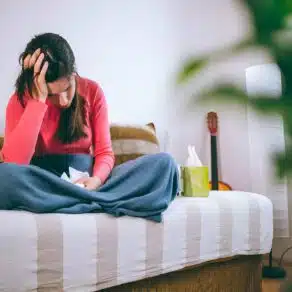Living with depression often means grappling with a host of challenges that extend far beyond the realm of mental health. One of the most significant areas affected by depression is sleep. Understanding how depression affects sleep is crucial for both individuals experiencing depression and those seeking to support them through their struggles.
The Bidirectional Relationship
Depression and sleep have a complex, bidirectional relationship. While depression can disrupt sleep patterns, poor sleep quality can also exacerbate symptoms of depression. This interplay often creates a vicious cycle, where sleep disturbances fuel depressive symptoms and vice versa.
Disrupted Sleep Patterns
One of the hallmark effects of depression on sleep is disrupted sleep patterns. Individuals may struggle with insomnia, finding it difficult to fall asleep or stay asleep throughout the night. On the other hand, some may experience hypersomnia, sleeping excessively yet still feeling fatigued during the day.
REM Sleep Alterations
Rapid Eye Movement (REM) sleep, a crucial stage of the sleep cycle associated with dreaming and memory consolidation, is often impacted by depression. Research suggests that individuals with depression may spend less time in REM sleep or experience disruptions in this stage, leading to cognitive impairments and emotional dysregulation.
Sleep Architecture Changes
Depression can also affect the overall architecture of sleep, including the distribution of sleep stages throughout the night. Some studies have found alterations in the proportion of slow-wave sleep (deep sleep) and REM sleep, which can further contribute to daytime fatigue and cognitive difficulties.
Sleep-Wake Cycle Disturbances
Individuals with depression may also experience disturbances in their sleep-wake cycle, leading to irregularities in sleep timing. This can manifest as difficulty maintaining a consistent bedtime and wake-up time, further exacerbating sleep problems and contributing to overall sleep dissatisfaction.
Addressing Sleep Disturbances in Depression
Recognizing the impact of depression on sleep is essential for effective management and treatment. Integrating strategies to improve sleep hygiene, such as maintaining a consistent sleep schedule, creating a relaxing bedtime routine, and minimizing exposure to electronic devices before bed, can help alleviate sleep disturbances associated with depression.
Conclusion
Depression casts a wide net of influence, extending its reach into various aspects of life, including sleep. By understanding how depression affects sleep, individuals can better navigate their symptoms and implement targeted strategies to improve sleep quality and overall well-being. Through a multifaceted approach that addresses both mental health and sleep hygiene, individuals can take proactive steps towards managing their depression and reclaiming restful, rejuvenating sleep.





